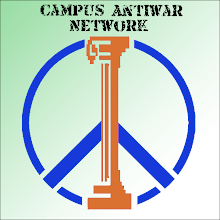
2008 has been a year of protests - the Democratic and Republican National Conventions being the focal point, but there have also been attempts to shut down the construction of I-69 in Indiana, and the most recent protest outside the final Presidential debate, where vets were attacked by mounted police (as Patricia talked about in a previous post).
All of these protests show an increasing criminalization of dissent, as non-violent protest have been violently suppressed by the police.
At the Democratic National Convention, police mass-arrested over 100 people who were engaged in completely non-violent protests. The police first pushed media out of the area, then unleashed a wide array of weapons against the protesters, ranging from tear gas to their batons. The police were not wearing any sort of identification, meaning that individual officers were able to do as they wished with relative impunity.
This feeling of impunity has continued even after the DNC. The Denver Police have created and are selling a shirt reading "We get up early to BEAT the crowds - 2008 DNC". Such contempt for protesters underscores a larger contempt for our right to be on the street. By assuming a framework wher the only response to non-violent protest is with violent repression, the sale of such shirts creates the possibility for greater violence and repression at future events. Without the ability to hold officers - or the police department as a whole - accountable for their actions, we allow them to escalate their tactics.
The Republican National Convention, a week after the Democratic Convention, underscored this point. As one observer noted, "In Denver they prepared for a riot. In St. Paul, they prepared for the apocalypse."
And an apo
 calypse is what they got - an apocalypse caused by the police.
calypse is what they got - an apocalypse caused by the police.The repression began the weekend before the convention, when the police, most notably Ramsey County officers under the commnd of Sherrif Bob Fletcher, conducted a number of illegal raids on activist houses and convergent spaces. Literature, maps, and computers were among the items confiscated. Individuals at the locations at the time of the raids report that the police did not present warrants even when they were asked to do so, and did not respect individual's personal privacy. In addition, all present - including, in one instance, children - were had their hands zip-tied during the hour-long raid, and were individually photographed. Only later was a warrant made public, and included items ranging from mason jars and paint cans to X-Boxes and iPods.
The four days of the RNC were a perfect example of a police state. Individuals were snatched off the street by plainclothes police, and peaceful protests were violently broken up by police using horses, baton, bikes, tear gas, pepper spray, and concussion grenades. On Tuesday, Rage Against the Machine was physically prevented from taking the stage in an attempt to silence not only the protesters, but the culture of resistance (they responded by performing an a capella version of their songs, and then leading the crowd on a march on the Excel Center, which was violently dispersed later that evening). Thursday saw a mass arrest of over 300 people as they both protesters, media, and random citizens of St. Paul who were caught in the wrong place were forced onto a bridge and arrested.
Much has been written about the 4 days of police repression in St. Paul - CAN's own experiances can be found here. For more information on both the RNC and the DNC protests and repression, I strongly recommend Ground Noise and Static - it's a half hour video, and well
 worth it.
worth it.The repression in St. Paul was particularly breathtaking becasue it was not simply directed against those protesters who used direct action techniques. After the first day, the police clamped down on all protests, hanging permit times and violently breaking up rallies that occurred after the protests.
Their unbridled use of force is partly due to the insurance policy the Twin Cities forced the RNC to take out for police repression. The RNC paid $9 million to cover the costs of law suits in the case of police brutality. Effectively, this gave the police a $9 million safety net to do what they wanted, without having to explain themselves to the taxpayers of the Twin Cities.
A month and a half after the RNC repression, the Hampstead police attacked and wounded veterans and supporters as they tried to ask the candidates questions at the final presidential debate. The unconscionable use of the mounted police for such an event, and the use of those horses as weapons against non-violent protesters who were already on the sidewalks, was just one more example of the increasing brutality of the police against nonviolent (albeit unorthodox) protesters.
But we will not be silenced! This November, hundreds will be joinging the yearly protest at Fort Bragg, Georgia, to attempt to put an end to the brutal School of Americas. This March, tens, perhaps hundreds of thousands will partake in bi-coastal protests against the War, called for by a coalition of antiwar organizations. Our voices will be heard in the streets, and if we are met by the violence of the police, we will meet it nonviolently, and their violence will backfire on them, exposing their injustice to the world.

.png)
No comments:
Post a Comment